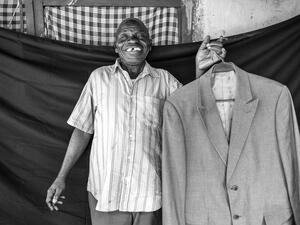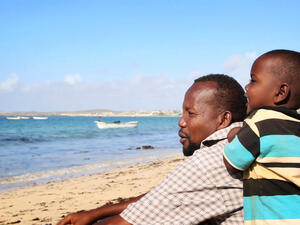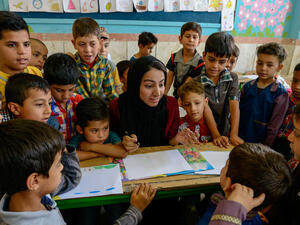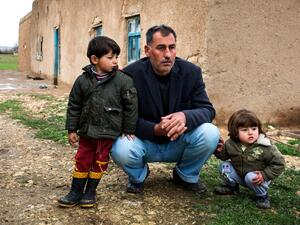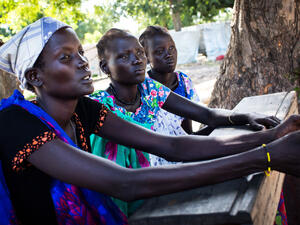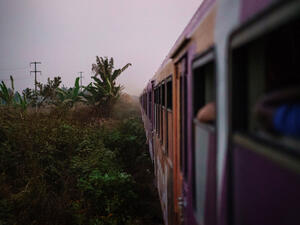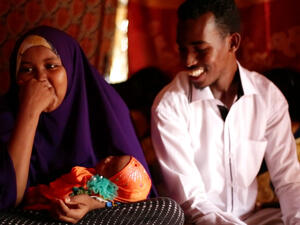UNHCR extends help to Arab returnees in northern Iraq
UNHCR extends help to Arab returnees in northern Iraq
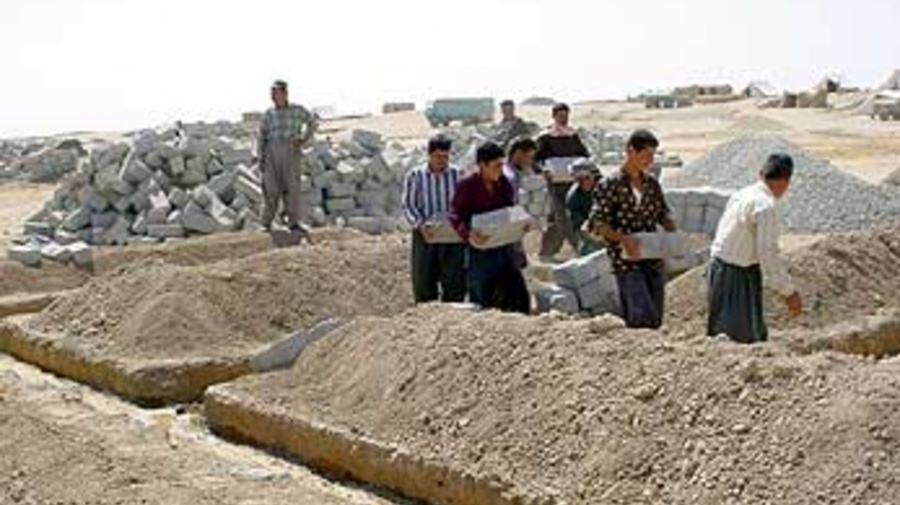
Iraqi returnees rebuilding their houses in Dingawa village, northern Iraq, with UNHCR assistance.
ERBIL, Iraq, August 18 (UNHCR) - The UN refugee agency has started helping Arab returnees in northern Iraq by improving water and medical services in their villages. This marks an extension of UNHCR's assistance - previously limited to the Kurds - to stabilise returnee communities in the northern part of post-war Iraq.
The first projects to be undertaken in Arab communities are unfolding in villages in the Haweeja area west of Kirkuk, where some 2,500 newly displaced Arabs in 500 families have gathered since the collapse of Saddam Hussein's government.
UNHCR is funding the improvement of the water supply system in Shawook, a village of 400 Arabs that hosts 85 returnees who had previously left to take over lands abandoned when ethnic minorities, mainly Kurds, were forced out of their homes by the previous government. The current rehabilitation work involves repairs on the water treatment plant and laying pipes for the supply of potable water.
At Tal-Ali village, the refugee agency is improving the local health centre that provides medical services to some 7,000 Arab residents and some Kurds in six villages.
In June, UNHCR started a programme to help stabilise communities where internally displaced people (IDPs) have returned to villages where there are no property disputes or other major problems. In four villages in Makhmour district outside Erbil, and two others in Dohuk, the refugee agency has provided tents, blankets, stoves, kitchen sets and jerry cans to returnees. In three of these villages, UNHCR has distributed concrete blocks and cement to enable the returnees to rebuild houses demolished during the campaign against Iraqi Kurds over the past few decades.
"The conflicts in Iraq have affected all communities. We believe they should all receive assistance in an even-handed fashion," said Pierre François Pirlot, UNHCR's regional co-ordinator for Northern Iraq, on the extension of UNHCR's assistance.
UNHCR estimates that 800,000 people have been displaced internally in Iraq by conflicts and expulsions of Iraqi Kurds. Most of them are living under poor conditions in collective centres and abandoned buildings. Since the fall of the previous government, some IDPs have begun returning to their original homes.
During a visit to Northern Iraq in July, High Commissioner Ruud Lubbers announced that UNHCR was initiating a phased programme to help IDPs go back to their original homes. He warned that a mass return to areas, particularly places where there are property disputes, could spark renewed conflict.
The refugee agency is also concerned about returns to villages where there are no shelters or basic infrastructure, as well as the danger of unexploded ordnance in some areas.
Meanwhile, the second convoy of some 250 Iraqi returnees from Saudi Arabia's Rafha camp arrived back in southern Iraq on Saturday. Their return was postponed by a few days due to unrest in Basra last week.
According to UNHCR, conditions in Iraq are not yet conducive to large-scale return. The agency said it is not promoting return to Iraq, and is only helping the repatriation of small numbers clamouring to go home this year.
When the situation stabilises in Iraq, the UN refugee agency expects to help up to 500,000 Iraqi refugees - as well as internally displaced Iraqis - to return home. UNHCR has appealed for $90 million for its Iraq programmes this year and to lay the groundwork for the eventual return of more Iraqis. So far the agency has received $59 million mainly from governments, including the United States, Canada, Japan, Germany, the United Kingdom, Kuwait, the Netherlands, Switzerland, France and Spain.



